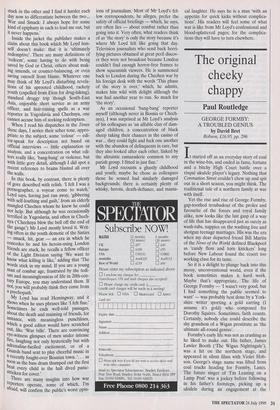The original cheeky chappy
Paul Routledge
GEORGE FORMBY: A TROUBLED GENIUS by David Bret Robson, £16.95, pp. 296 It started off as an everyday story of coal in the wine-bin, and ended in fame, fortune and a bitchy High Court battle over a risque ukulele player's legacy. Nothing that Coronation Street couldn't chew up and spit out in a short season, you might think. The traditional tale of a northern family at war with itself.
Yet the rise and rise of George Formby, gap-toothed troubadour of the proles and favourite of the forces and royal family alike, now looks like the last gasp of a way of life that has disappeared just as surely as wash-tubs, nappies on the washing line and shotgun teenage marriages. His was the era when my dear departed friend Bill Martin of the News of the World defined Blackpool as 'candy floss and torn knickers' long before New Labour found the resort too working class for its taste.
So it is a delight to plunge back into this messy, unconventional world, even if the book sometimes makes it hard work. Maybe that's appropriate. The life of George Formby — 'I wasn't very good, but I had something the public seemed to want' — was probably best done by a York- shire writer sporting a gold earring (I assume it's gold) who composed for Dorothy Squires. Sometimes, faith counts. Certainly, nobody else could describe the shy grandson of a Wigan prostitute as 'the ultimate all-round genius'.
Formby's early life was not as crushing as he liked to make out. His father, James Lawler Booth (`The Wigan Nightingale'), was a hit on the northern stage, and appeared in silent films with Violet Hob- son. George's stage name was lifted from coal trucks heading for Formby, Lancs. The future singer of 'I'm Leaning on a Lamp Post' was a jockey before following in his father's footsteps, picking up a ukulele during an engagement at the Barnsley Alhambra because he didn't know what to do with his hands.
He didn't know what to do with most other things, either, until he met the woman who was to dominate his life, on a double bill in Castleford: Beryl, a 'feisty' clog- dancer (were they ever anything else?) from Accrington. She hooked him, married him, managed him, starred with him, and con- trolled virtually every aspect of his life until her death a few years before him. 'If I leave George alone for a minute, he goes off and buys a new car or a new jumper,' she com- plained. She also cuckolded him, and he cheated on her when he found the nerve. But the partnership was a tremendous show-business success. From their many homes, always named Beryldene, she bullied impresarios into paying top rates, and the money usually went straight into the bank.
These days, we mostly know Formby from his low-budget knockabout films, as the daft lad with the mile-wide grin who gets everything wrong but always ends up defeating the smart-alecs and winning the girl. Life substantially imitated his art. However, he went through a private tor- ment of nervous breakdown and morphine addiction, largely brought on by ceaseless pressure from Beryl to make money and his own demonic urge to stay in the limelight.
One strange episode begs further investi- gation. Bret discloses the work, in the sec- ond world war, of the Dance Music Policy Committee, an official body charged with vetting songs, music and comedy routines, and for 'investigating artists' possible politi- cal and collaborationist leanings during wartime'. This extraordinary outfit accused George and Beryl, not of Nazi leanings (which would have been difficult given their exemplary record of visiting tommies in theatre), but of performing songs like `Swim Little Fish' and 'If I had a Girl Like You' that had been declared 'enemy friendly'. It was a put-up job by variety artistes who objected to Formby's strictures against stay-at-home entertainers. The plot failed, but it left a sour taste.
In later years, Formby never recaptured his cheekiness, bordering on the lewd, of pre-war days: 'Will he kiss her under the nose/Or underneath the archway where her sweet william grows?' even though he con- quered the West End stage. On his death in 1961, 150,000 people lined the streets lead- ing to his requiem mass in Warrington. But the real drama took place in the High Court in London three years later when his blind, 82-year-old mother and other relatives bit- terly and unsuccessfully contested George's last will that left everything to his 'floosie' fiancee Pat Howson. Litigation and death duties swallowed the bulk of his estate (small by today's standards), and most of what remained went to a Catholic convent.
He has had the last laugh, though, in what Harold Hobson called 'the true thea- tre, the real thing': his rendition, still played and still haunting of 'There's no other girl that I'd wait for . . . '



























































 Previous page
Previous page